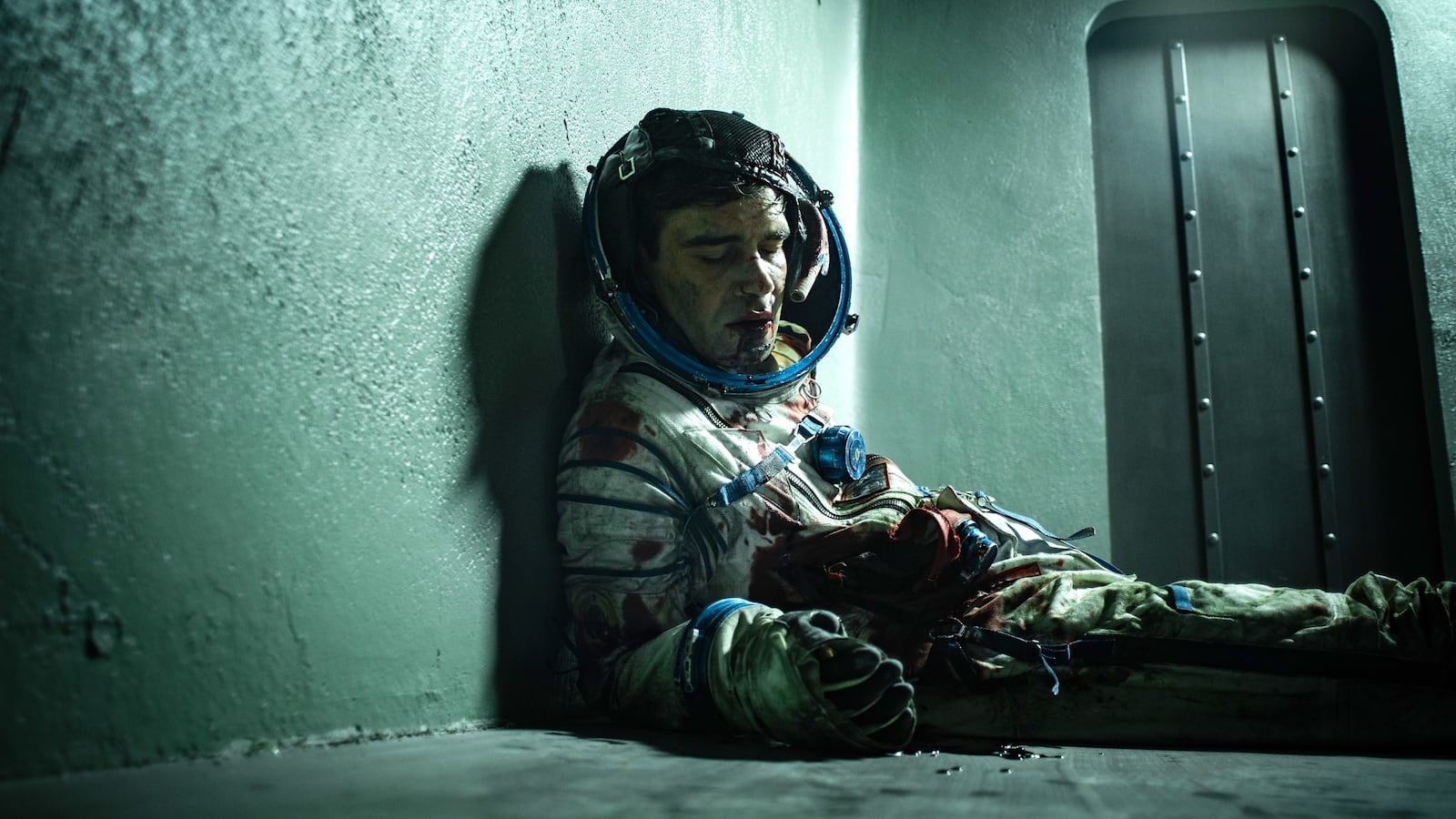In space, no one can hear you scream—and that’s also true of being in a secret Soviet research facility circa 1983, the setting of director Egor Abramenko’s Sputnik. A clever riff on Alien (and its sequel) that generates solid suspense from assured formal touches and a story that only succumbs to heavy-handed gestures at a few key moments, it’s a capable horror show that, like its spiritual ancestor, suggests that terror is born in the womb—and, also, that every country is home to its very own deviously warmongering Paul Reiser.
The untrustworthy official in question here is Colonel Semiradov (Fyodor Bondarchuk), a stout mystery man with a grey buzz cut and an equally severe demeanor. For a clandestine mission about which he won’t initially divulge much, Semiradov enlists the aid of Tatyana Klimova (Oksana Akinshina), a doctor presently being grilled for nearly drowning a patient as a means of curing his psychogenic seizures. Drastic measures for the greater good are Tatyana’s specialty, which makes her an ideal partner for Semiradov, who needs her help with a crisis that involves Konstantin Veshnyakov (Pyotr Fyodorov), the survivor of a two-man cosmonaut mission that ended in calamity, and which requires considerable risk-taking and rule-breaking behind the backs of their Party superiors.
That catastrophe serves as the prologue to Sputnik (on VOD now), although actual specifics are left fuzzy; all we know is that before their ship crash-landed back on Earth, a bloody-mouthed Konstantin moaning in agony and his copilot dead of a gnashed-head wound, the duo heard footsteps on the exterior of their orbiting craft. When Tatyana first gets a look at Konstantin, he’s being hypnotized by institute chief Rigel (Anton Vasilev) in a walled-off interrogation room that adjoins his sleeping quarters. Konstantin can’t remember anything about his ordeal, and doesn’t understand why he’s being kept under wraps like this, especially since he fancies himself a national hero who’s sacrificed everything for his motherland. His frustration is compounded by the fact that he hasn’t been able to contact his mother or his son (Vitaliya Korniyenko), who resides in an orphanage that the young wheelchair-bound kid continually attempts to escape.
Sputnik sets its scene with a modicum of fuss and a healthy dose of ominousness. Director Abramenko imagines his military-base setting as a veritable spacecraft, full of cold, sterile hallways, fluorescent green lighting and grim shadows. It’s a vision of the 1980s Soviet Union as an imposing and alien world, detached from reality and humanity, and run by menacing figures with little adherence to normal codes of conduct, or morality. Semiradov is an analytical and aloof overseer determined to manipulate Tatyana for his own purposes, and while his actual intentions aren’t immediately disclosed by the film, it’s not long before we get an idea of what he’s really up to—and what’s really happening in this remote outpost.
[Spoilers follow]
Tatyana’s first diagnosis of Konstantin is that he has PTSD, but it turns out his condition is far graver than that. At night, Konstantin falls off his bed and spits up a slimy extraterrestrial creature, one with two elongated arms upon which it props itself, a giant slithering tail, a pair of stunted legs, and a flattened winged head that resembles a stingray. This thing now permanently resides in Konstantin, and apparently, he has no clue that he’s its host; it emerges every night for about an hour, can’t hear, and leaves Konstantin out cold during its brief excursions. The foreign invader doesn’t seem to harm its carrier, although whether it’s a parasite (i.e. feeding off of Konstantin) or a symbiote (a creature intrinsically, harmoniously bonded with the cosmonaut) is one of many puzzles Tatyana has been brought here to solve.
The fiend is essentially Alien’s gestating xenomorph—if that organism had been perfectly cool hanging out inside John Hurt’s chest, and its on-screen arrival begins a figurative countdown to the moment Sputnik devolves into a bloodbath that Ripley-ish heroine Tatyana will have to survive. To that end, director Abramenko spends the middle section of his tale doling out details about the seemingly malevolent entity as well as both Konstantin and Semiradov, the former wracked with guilt over having abandoned his son, and the latter determined to control the creature (via Konstantin, or separate from him) as a weapon. Semiradov is the embodiment of the evil military-industrial complex, which renders him a rather stock antagonist. Still, his behavior is in keeping with a 1980s Soviet Union that covets every advantage over its Cold War enemies, wants to save face (regarding its heroic cosmonaut venture) at all costs, and cares little for sacrificing a few for the glory of the many.
There are horrific revelations to come about both Konstantin’s intergalactic hitchhiker and the ruthless Semiradov, and accompanied by a mix of blaring horns and crashing drums fit for a Christopher Nolan film, they generally land with satisfying impact. Less successful are intermittent asides to Konstantin’s boy, who’s leadenly equated with the alien (see, they’re both his children!), as well as an early sequence in which Tatyana reveals a beguiling scar along her back (which goes unexplained) and is then accosted by a facility guard (which is never revisited). One suspects that those latter points were related to excised material that might be restored in a future director’s cut, or might be addressed in a sequel, since despite being a stand-alone affair, Sputnik nonetheless has a concept ideal for follow-up installments.
Along with its visual sheen, gliding camerawork, and squelching CGI effects, the fact that Abramenko’s film is a potential franchise-starter marks it as a communist-era tale cast in a distinct Hollywood mold. Like countless efforts before it, Sputnik is the progeny of Ridley Scott’s seminal 1979 nightmare, a modernized mutation that resembles its parent and yet develops in its own unique way. Wielding American movie techniques to tell a story about the devastation an invader wreaks on the Soviet Union, it’s an out-of-this-world thriller that, formally speaking, doubles as a sly commentary on the United States’ victory—then, and now—in an East-West battle for global cultural supremacy.


